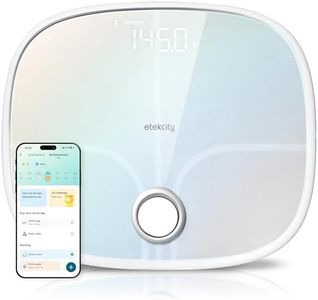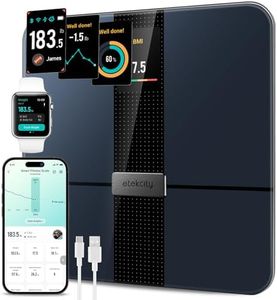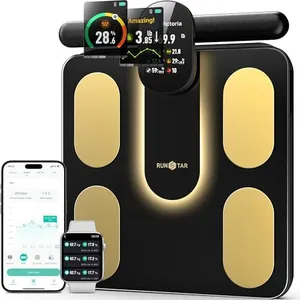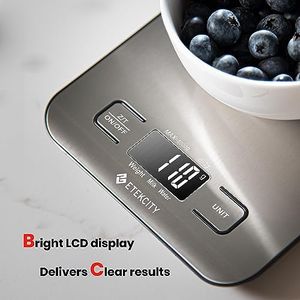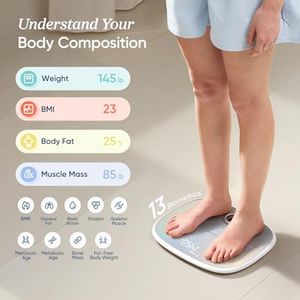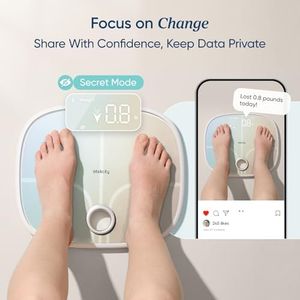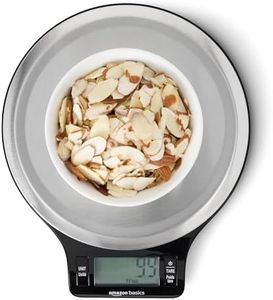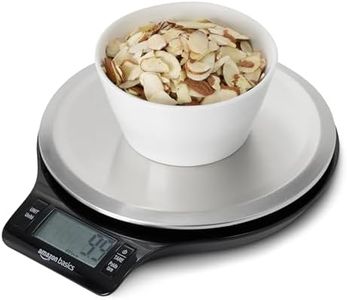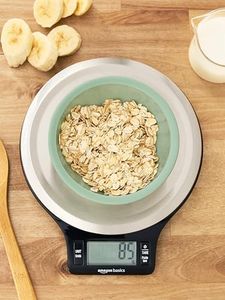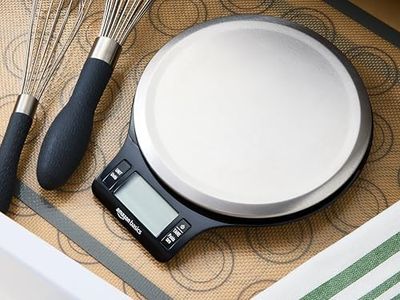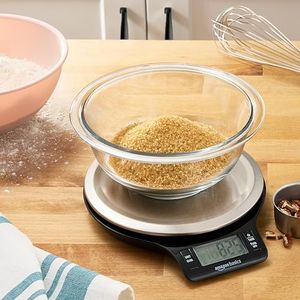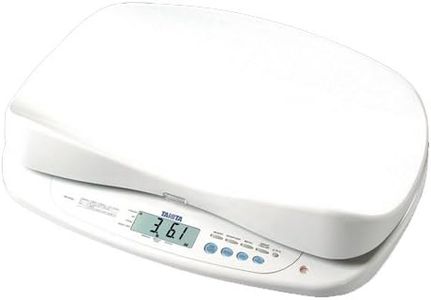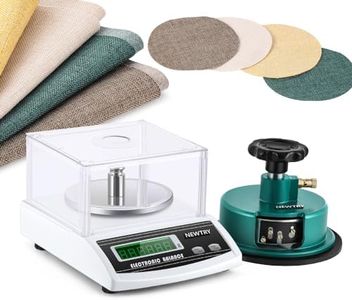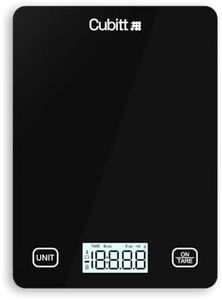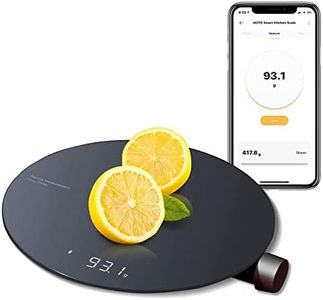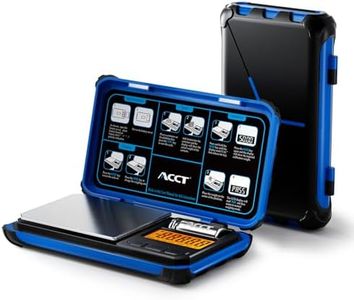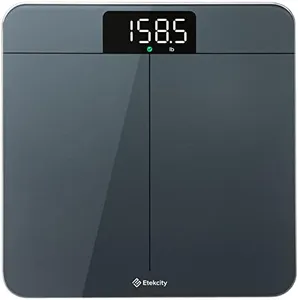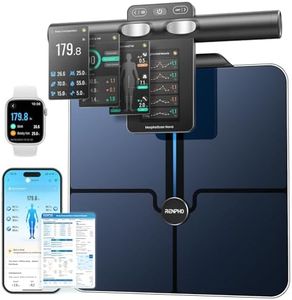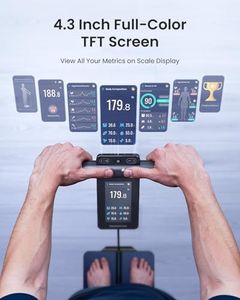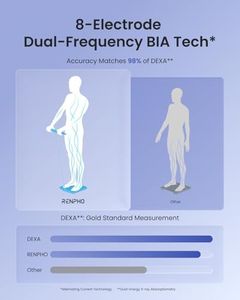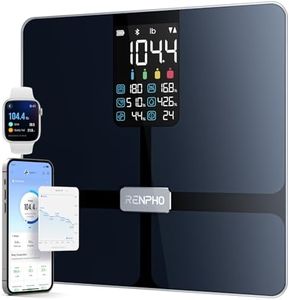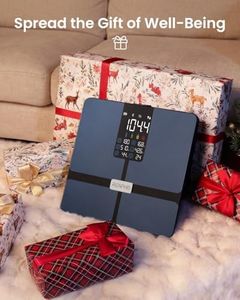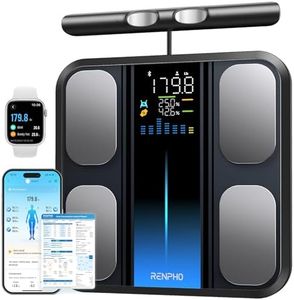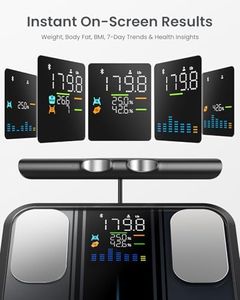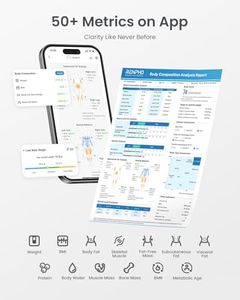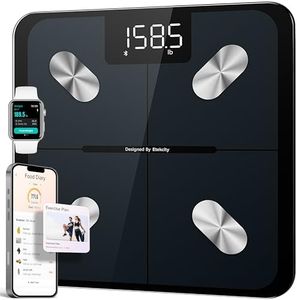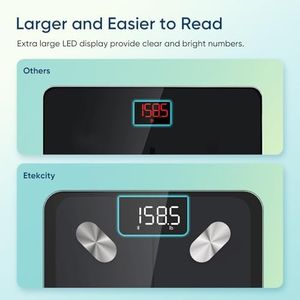10 Best scales 2026 in the United States
Winner
Etekcity Food Kitchen Scale, Digital Grams and Ounces for Weight Loss, Baking, Cooking, Keto and Meal Prep, LCD Display, Medium, 304 Stainless Steel
The Etekcity Food Kitchen Scale is a solid choice for everyday kitchen use, especially if you need precise measurements for cooking, baking, or meal prepping. It can weigh ingredients up to 11 pounds (5 kilograms) with an accuracy of 1 gram, which is sufficient for most home cooking tasks. The scale supports five different units including ounces, pounds, grams, and milliliters, making it versatile for various recipes and diets like keto. Its backlit LCD display is clear and easy to read, even in dim lighting, thanks to large numbers.
Most important from
172968 reviews
Etekcity Smart Rechargeable Scale for Body Weight, BMI, Fat, Muscle Mass, FSA&HSA Eligible, Digital Bathroom Scale with 13 Metrics, Secret Mode, Bluetooth Connect to Free Apps, Rainbow White
The Etekcity Smart Rechargeable Scale offers precise tracking with accuracy down to 0.1 lb, which is great for those serious about monitoring their body weight and composition. It measures 13 key health metrics including BMI, body fat, and muscle mass, providing a more detailed picture than a basic scale. The LED display is large and clear, and the rainbow white finish adds a stylish, modern touch while remaining portable thanks to a built-in handle.
Most important from
587 reviews
Etekcity FSA&HSA Eligible Smart Scale for Body Weight Fat, Digital Bathroom Weighing Machine for Accurate BMI Muscle Mass Composition, Home Use Apple Health Compatible Fitness Equipment
The Etekcity Smart Scale is a feature-rich digital bathroom scale designed for people who want more than just basic weight measurement. It offers solid accuracy thanks to an improved ITO-coating and guides your feet placement for consistent results, which is great if you want reliable tracking. The scale supports up to 14 body metrics including weight, BMI, body fat, muscle mass, and heart rate, giving you a broader picture of your health than a regular scale. The colorful TFT display is easy to read and interactive, showing your progress and allowing some personalization without needing your phone.
Most important from
5787 reviews
Top 10 Best scales 2026 in the United States
Winner
Etekcity Food Kitchen Scale, Digital Grams and Ounces for Weight Loss, Baking, Cooking, Keto and Meal Prep, LCD Display, Medium, 304 Stainless Steel
Etekcity Food Kitchen Scale, Digital Grams and Ounces for Weight Loss, Baking, Cooking, Keto and Meal Prep, LCD Display, Medium, 304 Stainless Steel
Chosen by 1130 this week
Etekcity Smart Rechargeable Scale for Body Weight, BMI, Fat, Muscle Mass, FSA&HSA Eligible, Digital Bathroom Scale with 13 Metrics, Secret Mode, Bluetooth Connect to Free Apps, Rainbow White
Etekcity Smart Rechargeable Scale for Body Weight, BMI, Fat, Muscle Mass, FSA&HSA Eligible, Digital Bathroom Scale with 13 Metrics, Secret Mode, Bluetooth Connect to Free Apps, Rainbow White
Etekcity FSA&HSA Eligible Smart Scale for Body Weight Fat, Digital Bathroom Weighing Machine for Accurate BMI Muscle Mass Composition, Home Use Apple Health Compatible Fitness Equipment
Etekcity FSA&HSA Eligible Smart Scale for Body Weight Fat, Digital Bathroom Weighing Machine for Accurate BMI Muscle Mass Composition, Home Use Apple Health Compatible Fitness Equipment
Amazon Basics Digital Kitchen Scale with LCD Display, Batteries Included, Weighs up to 11 pounds, Black and Stainless Steel
Amazon Basics Digital Kitchen Scale with LCD Display, Batteries Included, Weighs up to 11 pounds, Black and Stainless Steel
Tanita BD815U Baby Scale – Digital Infant Weight Monitor for Newborns, 33 lb Capacity – Memory Function, Removable Tray – Backlit Display – Battery or AC Power, RS232 – Japan Technology
Tanita BD815U Baby Scale – Digital Infant Weight Monitor for Newborns, 33 lb Capacity – Memory Function, Removable Tray – Backlit Display – Battery or AC Power, RS232 – Japan Technology
RENPHO Smart Scale for Body Weight, 8-Electrode Body Composition Scale with BMI, Body Fat, Muscle Mass, Rechargeable Body Fat Scale with Full-Color TFT LCD on Handle, MorphoScan Nova
RENPHO Smart Scale for Body Weight, 8-Electrode Body Composition Scale with BMI, Body Fat, Muscle Mass, Rechargeable Body Fat Scale with Full-Color TFT LCD on Handle, MorphoScan Nova
RENPHO Scale for Body Weight, Smart Scale with BMI, Body Fat, Muscle Mass, Bluetooth, 13 Metrics with Large Display, Support App Connection, Black, Elis 2X
RENPHO Scale for Body Weight, Smart Scale with BMI, Body Fat, Muscle Mass, Bluetooth, 13 Metrics with Large Display, Support App Connection, Black, Elis 2X
RENPHO Smart Scale for Body Weight, FSA&HSA Eligible, 8-Electrode Digital Bathroom Scale with BMI Body Fat Muscle Mass, Body Composition Analyzer, Larger Platform, MorphoScan Base
RENPHO Smart Scale for Body Weight, FSA&HSA Eligible, 8-Electrode Digital Bathroom Scale with BMI Body Fat Muscle Mass, Body Composition Analyzer, Larger Platform, MorphoScan Base
Etekcity Smart Scale for Body Weight, FSA&HSA Eligible, Bathroom Digital Weighing Scale with BMI, Body Fat, Muscle Mass, Accurate Bluetooth Home User Health Equipment Sync Apps
Etekcity Smart Scale for Body Weight, FSA&HSA Eligible, Bathroom Digital Weighing Scale with BMI, Body Fat, Muscle Mass, Accurate Bluetooth Home User Health Equipment Sync Apps
Our technology thoroughly searches through the online shopping world, reviewing hundreds of sites. We then process and analyze this information, updating in real-time to bring you the latest top-rated products. This way, you always get the best and most current options available.


